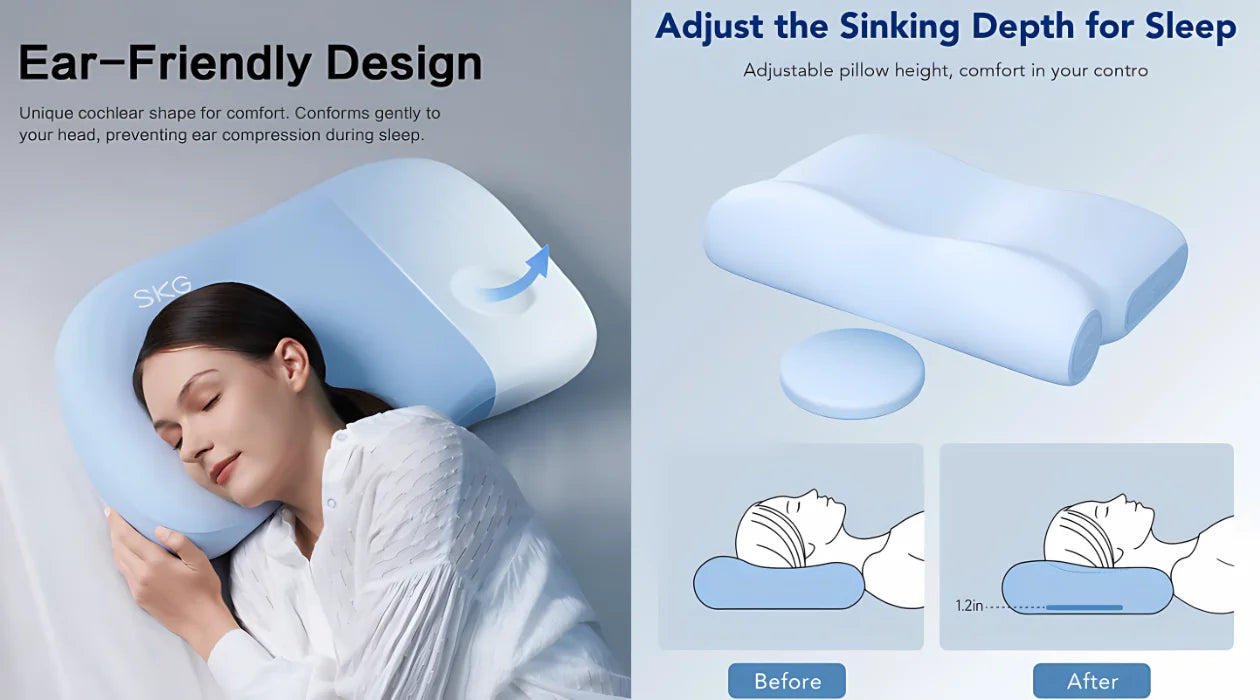Neck pain can be caused by a variety of reasons, including muscle strain, poor posture, and injury.
Many people experience neck discomfort from sitting in front of a computer for long periods or sleeping in an incorrect position, what would you do to relieve your neck pain?
In this article, we will cover the symptoms and causes of neck pain, as well as some ways to relieve neck pain.
Neck Cervical Pain Symptoms

Neck pain can take many forms. Here are the specific symptoms:
- Neck stiffness: Difficulty moving the neck, such as turning the head from side to side or bending forward or backward. It is often worse in the morning after waking up or after holding the neck in one position for a long time.
- Severe pain: Sudden, severe pain in one part of the neck, usually when moving the neck in a certain direction.
- General pain: Mild to moderate pain that extends from the neck to the shoulders and upper back, usually due to muscle tension or minor injuries.
- Radiating pain: Pain that extends from the neck to the shoulders, arms, or back, often with a burning or tingling sensation.
- Numbness or tingling: Pins and needles sensation, usually in the arms or hands. This symptom is called paresthesia and may also be accompanied by loss of feeling or numbness in these areas.
- Muscle weakness: Weakness in the arms or hands, making tasks such as lifting objects, grasping, or typing difficult.
- Headache: Pain that starts in the neck and extends to the back of the head.
7 Causes of Neck Pain
There are many different causes of neck pain, but here are some common ones:
Muscle Tension and StrainMuscle tension or strain can occur from sudden movements, exertion, or holding the same position for a long time. Looking down at your phone or computer for a long time can cause fatigue and tension in your neck muscles.
Joint ProblemsArthritis or bone spurs in your cervical spine can cause stiffness and pain in your neck. As you age, wear and tear and degeneration of your cervical spine can lead to joint problems, which can cause chronic pain.
Disc ProblemsA herniated or degenerated disc can compress a nerve, causing pain. This condition is often accompanied by numbness and tingling in the arm or hand, and in severe cases can even affect the strength and function of the hand.
TraumaExternal trauma, such as a car accident, fall, or sports injury, can cause injury to the muscles, ligaments, or bones in your neck, resulting in severe pain and limited mobility. One of the most common types of trauma is "whiplash," which often occurs in car accidents.
Poor PostureMaintaining an incorrect sitting or standing position for a long time, such as hunching over, can cause neck muscle tension and pain. Poor sleeping posture, such as using an inappropriate pillow or mattress, or sleeping with your head at an unnatural angle, can also cause neck pain.
Stress and TensionEmotional stress and tension can cause neck muscle tension and pain. Long-term mental stress not only causes muscle tension but also affects blood circulation and the nervous system, further exacerbating pain.
DiseasesCertain diseases, such as fibromyalgia, infections, or tumors, can also cause neck pain. For example, people with fibromyalgia often feel pain all over their body, including in their neck. In addition, tumors or other lesions in the neck can also compress nerves and tissues, causing pain.
How to Treat Neck Pain
Neck pain can range from mild discomfort to severe pain. Here are some effective ways to treat different levels of neck pain:
Minor Neck Pain
To relieve minor neck pain, it is important to avoid activities that strain the neck. Resting the neck will help relieve pain and prevent further discomfort. For the first 48 hours, use an ice pack to reduce inflammation. After that, switch to heat to relax the muscles and relieve pain. Additionally, if you're in real pain, over-the-counter medications such as ibuprofen or acetaminophen can be effective in relieving minor aches and pains, if appropriate. However, it is recommended to take them on the advice of your doctor .
Moderate Neck Pain
Perform physical therapy exercises to strengthen neck muscles and improve flexibility.
Massage is one of the most effective ways to relieve neck pain. It provides instant relief by relaxing tense muscles and increasing blood circulation.
If you want to get quick relief from neck pain and enjoy a massage at home or anywhere, try the SKG Neck Massager. It uses heat and shiatsu massage to relax neck muscles.

Severe Neck Pain
Use a neck brace to stabilize the cervical spine by providing support and limiting movement. However, long-term use is not recommended because it can weaken neck muscles.
In severe cases, corticosteroid injections can reduce inflammation and pain.
If neck pain persists, worsens, or is accompanied by severe symptoms, such as loss of balance, coordination, or bladder control, see a doctor immediately. Surgery is often used when conservative treatments are ineffective or when serious structural problems are present.
How to Treat Neck Pain From Sleeping
Neck pain can be caused by a number of factors during sleep, including sleeping position, mattress and pillow choice.
Certain sleeping positions tend to trigger neck pain, especially when sleeping on your back, where tilting your head to one side can cause strain on the neck muscles, which in turn can cause pain, stiffness, and spasms. To prevent neck pain, sleeping on your side or back is recommended.
Using unsuitable pillows can also gradually trigger pain. Therefore, it is important to choose a pillow that suits your sleeping habits. If you sleep on your back, place a small pillow under your knees to relax your neck muscles and keep your spine flat. In addition, a small support pillow under the back of your neck can help keep your back in a neutral position. If you sleep on your side, it's especially important to choose a pillow that keeps your neck in line with your body.
Hot and Cold Therapy
Hot and cold therapy is very effective in relieving neck pain. Use ice packs for the first 48 to 72 hours of neck pain, followed by heat therapy. Heat therapy can be administered through warm baths, heating pads, or hot packs for 10 to 15 minutes at a time.
When using ice therapy, a frozen washcloth, a bag of ice or even a bag of frozen vegetables can be applied to the affected area. To protect the skin, a thin dry cloth should be wrapped around the cold pack. Apply ice for 15 to 20 minutes at a time and repeat every two to four hours until the pain subsides.
Always use caution and follow the safety instructions for hot and cold pads or hot cloths when applying hot and cold therapy to prevent skin damage.
In addition, over-the-counter pain relievers and massage techniques such as those described above can help.
Proper neck exercises can also help reduce neck pain.
Exercises to Relieve Neck Pain
Here are some exercises that can help relieve this discomfort by strengthening and stretching the neck muscles:
Neck Stretches
Keep your spine straight while sitting or standing up. Gently tuck your chin toward your chest to create a double chin. Hold for 5-10 seconds. Repeat 10 times.
Sit or stand up with your spine straight. Slowly tilt your head to the right, trying to touch your ear to your shoulder without lifting your shoulder. Hold for 15-30 seconds. Repeat on the left side. Repeat 3 times on each side.
Neck Strengthening Exercises
Place your palm on your forehead. Push your head toward your palm without moving your head. Hold for 5-10 seconds. Repeat 5 times.
Place your right palm against the right side of your head. Press your head against your palm without moving your head. Hold for 5-10 seconds. Repeat on the left side. Repeat 5 times on each side.
Range of Motion Exercises
Sit or stand up with your spine straight. Slowly turn your head to the right until you feel a slight stretch. Hold for 15-30 seconds. Repeat on the left side. Repeat 3 times on each side.
Sit or stand with your spine straight. Slowly lower your chin toward your chest. Hold for 15-30 seconds. Repeat 3 times.
Sit or stand with your spine straight. Gently tilt your head back and look up at the ceiling. Hold for 15-30 seconds. Repeat 3 times.
Neck and Shoulder Stretch
Sit or stand with your spine straight. Grasp your right wrist behind you with your left hand. Pull your right arm slightly to the left while tilting your head to the left. Hold for 15-30 seconds. Repeat on the other side. Repeat 3 times on each side.
Sit or stand with your spine straight. Squeeze your shoulder blades. Hold for 5-10 seconds. Repeat 10 times.
How to Prevent Neck Pain
SKG and Maye Musk have been advocating a healthy lifestyle, which is effective in preventing neck pain, back pain, and more. Here are some effective strategies:
- When sitting or standing, keep your head centered on the spine. Avoid hunching or bending your neck for long periods of time.
- Make sure your computer monitor is at eye level and that your chair supports your lower back and head.
- Take regular breaks, stretch, and move your body, especially when sitting for long periods.
- Use a cervical pillow that supports the natural curve of your neck. Avoid sleeping on your stomach, as this can strain your neck muscles. Sleeping on your back or side is usually recommended.
- Keep your neck muscles strong and flexible through regular physical activity. This includes exercises that target the neck and upper back muscles. Activities such as yoga and Pilates
- Avoid carrying heavy bags, especially heavy shoulder bags. This can strain your neck.
- Use your phone at eye level instead of bending your neck to look at it. Consider using a headset or speakerphone for long phone calls to avoid neck strain.
Summary
Maintain a good lifestyle, exercise regularly, and take breaks to avoid fatigue. You can relieve common neck pain at home with treatments such as neck massage and hot and cold therapy. If the pain is severe, seek medical advice.




